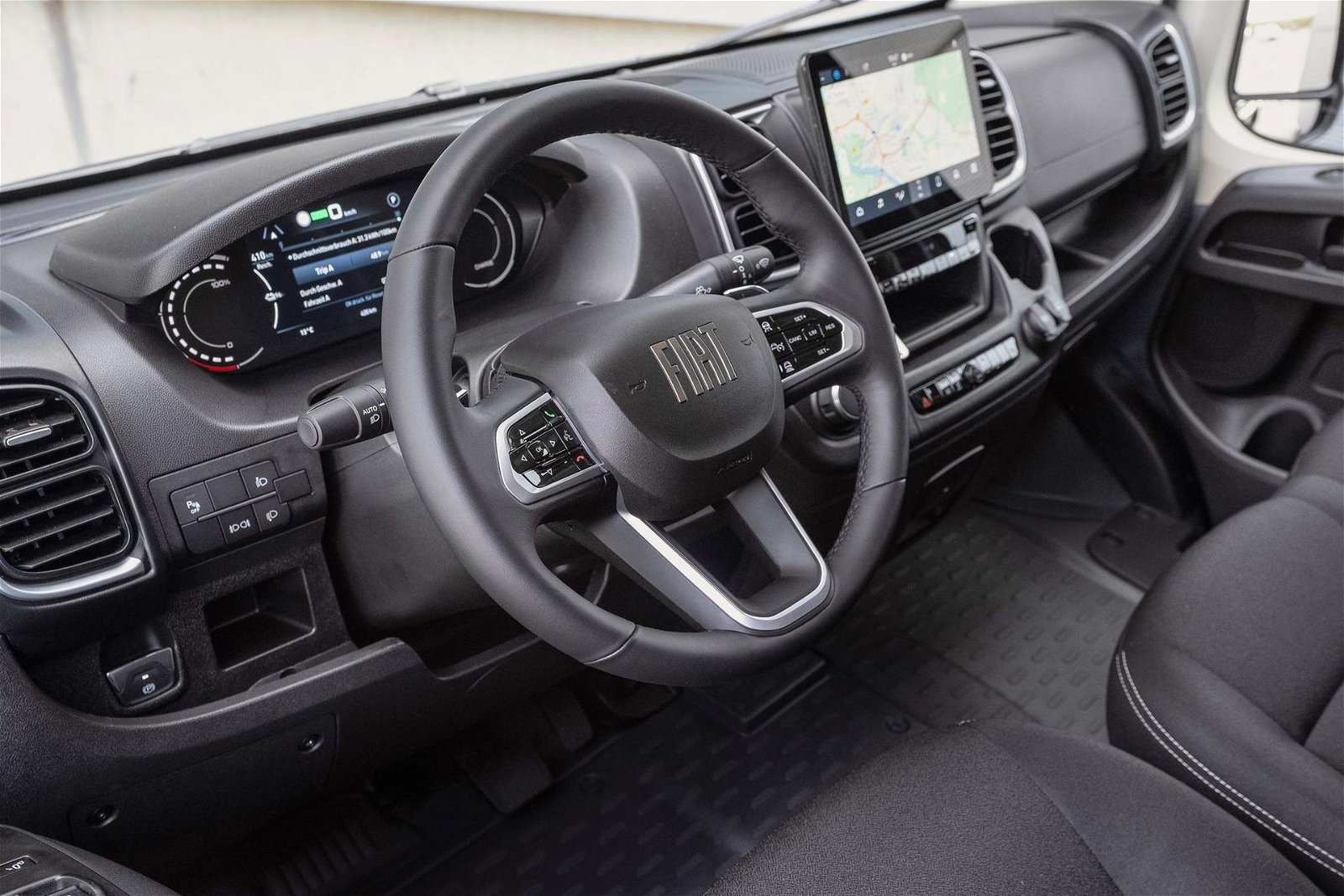Fiat refreshes the E-Ducato and gives the van a modern battery size of 110 kilowatt hours and more power than before with 200 kW / 272 hp. We test drove it for you.
Gone are the days when commercial vehicles were simple means of transportation. Nowadays, Fiat E-Ducato or Renault Master E-Tech drivers are not just assistants who get behind the wheel in dusty overalls, but often small business owners, technicians and technicians in one person. That is why the interior of cars is increasingly turning into a mobile office. If you like, the E-Ducato can also be luxurious. Many piano lacquers decorate applications and other buttons.

The E-Ducato will probably have harder plastics for tough everyday use. After all, every extra costs money. But that doesn’t change the fact that a lot has happened with the Italian electric car. This particularly affects the train. Instead of just 90 kW / 122 hp, the electric motor now drives the front wheels with 200 kW / 272 hp and a torque of 410 Newton meters. To ensure that the electric truck does not run out of air prematurely, the battery capacity is increased to 110 kilowatt hours and thus the range to a maximum of 424 km (according to the WLTP cycle). For our L4H2 version it is 376 km. This change is not accidental. The battery and drive train (previously from Solar Edge) come from the Chinese company CATL.
As with other transporters, the cockpit and driving experience in the E-Ducato are increasingly car-like. Standard features include remote control via the steering wheel buttons, a seven-inch display behind the steering wheel, a ten-inch touchscreen, DAB radio and automatic climate control. In the Italo electric cargo van, the driver is also supported by a lane assistant, adaptive cruise control and a rearview mirror that displays the image from the camera.


However, the recognition of the traffic license plate does not work without errors. Electronic stability control has become ubiquitous in modern commercial vehicles. It includes trailer stability control, crosswind assist, anti-rollover, anti-skid control, hill start assist and dynamic load control, which takes into account load storage. Post-collision braking is understood, where the car brakes automatically after a serious accident, even if the driver is no longer capable of doing so. This technology prevents the Ducato from running like a multi-ton pod without a driver.


We left and immediately felt at home in the 6.36 meter long and 2,835 kg vessel. Looking at the instrument panel assures us: with a fully charged battery and an outside temperature of 16 degrees, the range is 408 km. The increased power of the car allows the E-Ductato to move forward almost a little despite the load of 400 kg. There is enough space: cubic meters 15 fit into the 4.07 meter long cargo space of the L4H2 variant, which equates to 15,000 litres. If that’s not enough, the E-Ducato also tows a 2.4-tonne trailer.
Even in the Eco driving program, where the engine output is limited to 120 kW / 163 hp and a maximum speed of up to 90 km / h, the Fiat has enough power for city and country roads. We usually drive normally with an output of 160 kW / 218 hp. You should only use the power setting to get full power if you are in a hurry.


As usual with modern electric cars, you can use the rockets located directly behind the steering wheel to define the adjustment force in four levels: from cruise to the third level. Left (minus) increases power and right (plus) decreases it. Maximum energy recovery is delayed as soon as you take your foot off the accelerator. We decide on cruising, which makes more sense in terms of energy, since you recover when braking. After our test drive, in which we never reached a maximum speed of 130 km / h, the on-board computer reported 34.8 kWh / 100 km, which is 5.4 kWh / 100 km more than stated in the data sheet.
When it comes to recharging, the E-Ducato offers standard charging options. Since every penny counts in the shipping industry, the 11 kW AC charger is enough to fully charge the 110 kWh batteries in the depot at once. One battery charge is usually enough, as the E-Ducato is used in distribution transport.
If you still need something quick, the Stromer van uses a DC fast charging station with up to 150 kW of electricity. The energy reserve is filled from zero to 80 percent in 55 minutes. Just enough time to treat yourself to two meatloaf rolls and a cold drink during your lunch break. By the way, you can also eat in E-Ducato. In addition to many shelves, the Italian transporter also provides small tables for passengers.
























